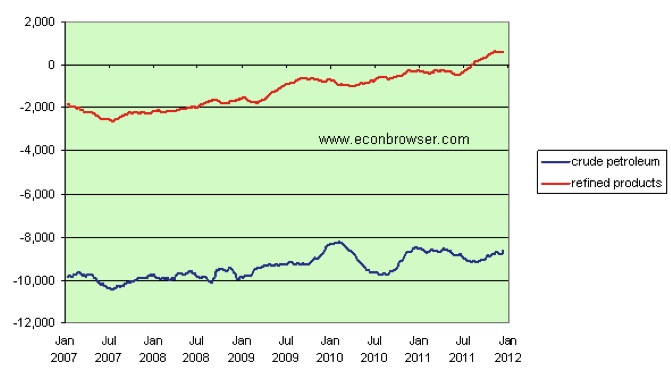
The AP is reporting that for the first time since Harry Truman was president, the U.S. is a net exporter of refined petroleum products. In fact, fuel was the country’s top export in 2011, totaling $73.4 billion.
However, “the small positive net export balance on petroleum products is still completely dwarfed by the huge negative balance on crude petroleum,” wrote James Hamilton, an oil economics expert at UC-San Diego, on his EconBrowser blog. Last year, between January and October, the U.S. spent about $280 billion on 2.7 billion barrels of oil.
The news of the surge of U.S. fuel exports just solidifies oil's place as a major economic driver in this country -- it in no way indicates that we're becoming self-sufficient producers. The U.S. adds value through the refining process and sells it abroad (buying from abroad almost the same amount) but for the raw materials, we're still hopelessly hooked on foreign sources.
The U.S. is producing somewhat more crude oil, mostly in North Dakota, but is still importing enormous quantities of the stuff. We're nowhere near closing the import/export gap on crude oil.
The AP story indicates that the numbers obliterate the argument in favor of increased oil refining in the U.S.: “And up until a few years ago, whenever gasoline prices climbed, there were complaints in Congress that U.S. refiners were not growing quickly enough to satisfy domestic demand; that controversy would appear to be over.” The controversy over expanding oil drilling, though, rages on.
Still, if the U.S. is producing so much gasoline, why isn't gas cheaper? The AP’s Chris Kahn seems to think it should be, considering how much gasoline originates here. He blames the exports: "The more fuel that's sent overseas, the less of a supply cushion there is at home."
Exporting fuel isn’t what’s driving prices up, says Mark Thoma, economics professor at the University of Oregon. Gas prices are set on the world market, he says, and the U.S. would have to implement extreme new measures to lower prices.
“If we were to close our borders and say no foreign demand can enter the U.S., we could lower gas prices,” Thoma said. “We could make laws saying we can’t export fuel, and that would lower prices but it would also shut down capacity, so it’s counterproductive in the long run.”
Of course, U.S. gas prices are still ridiculously low, compared to the rest of the world.
The fuel export numbers highlight one bit of good news: The U.S. is using less fuel. In 2009, the country burned less fuel than it had since 1998. Demand dropped another 2.5 percent in 2011, according to the AP. Fuel efficient vehicles and unemployment can’t take all the credit, either: Americans are simply driving less, according to some indicators.





